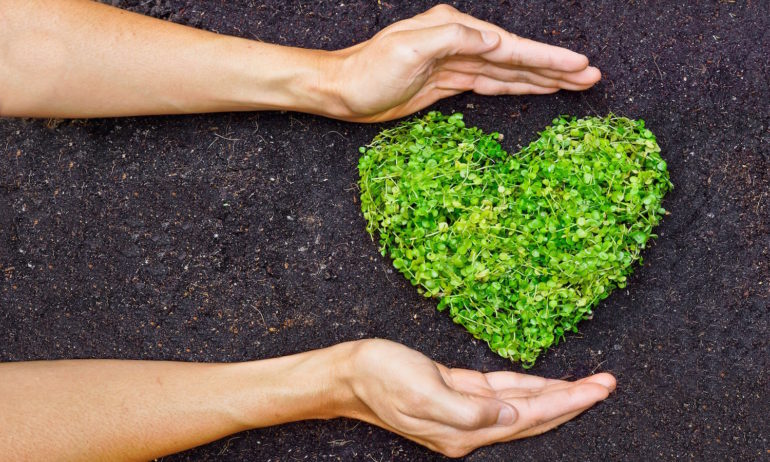From Danielle Nierenberg
Greetings from Milan and happy Valentine’s Day!
This week we are excited to spread some love, but we want to highlight the importance of being mindful of waste. Chocolates wrapped in plastic and waxed cardboard, greeting cards with additional plastic covering, and even
I want to challenge you to come up with the most sustainable, eco-friendly Valentine’s Day celebration ever. We waste about one-third of the food we produce every year and at peak holiday seasons, the amount of garbage waste increases by an estimated 25
While plastic can be difficult to avoid, there are companies providing alternatives to pesky plastics. A zero waste lifestyle might sound daunting, but there are lots of inspiring people who document their waste-free lifestyles to help others do the same. In this week’s newsletter, we’ve included a list of seven ways you can celebrate Valentine’s Day (and other Hallmark holidays) without filling up the trash.
Tips include:
- Visiting a local boozery
- Taking a cooking class
- Cooking a meal at home
- Gifting sustainable wine and chocolate
- Playing in the outdoors
- Paying it forward
- Buying an eco-friendly gift
Contributing Author: Kirby Barth
Let’s give the planet some love this Valentine’s Day instead of waste! According to the U.N. Food and Agricultural Organization (FAO), “approximately 8 million metric tons of plastic waste enters the ocean every year.” But this Valentine’s Day skip the plastic packaging, conflict diamonds, and chocolate. Buy compostable Valentine’s cards, responsibly sourced jewelry, or find a treat that was produced sustainably or with edible packaging. Food Tank has compiled a list of ideas to celebrate Valentine’s Day with your loved ones while loving the Earth. - Visit a local brewery, distillery, or winery.
There are lots of ways to drink responsibly and sustainably, from brewers using smart crops, low-impact spirits and biodynamic wines. As craft breweries continue to pop up around the world, brewers continue to innovate by creating recipes with unique flavors. Some prefer to forage their own ingredients, and others rely heavily on farm crops. By supporting producers who source directly from farmers, you’re also supporting farmers. Spirits require a lot of energy to produce, but you can choose a distillery who is making an effort to reduce their carbon footprint. Biodynamic wines are produced from grapes grown by biodynamic farming. This method approaches the vineyard as an entire ecosystem and also considers external astrological influences into the growing cycle. You can find a list of biodynamic wine producers here. - Take a cooking class.
Knowing how to cook your own meals is an important skill for people from all walks of life. Cooking classes are a great way to learn basic cooking skills, and also provide an opportunity to use ingredients you may have not worked with before. Knowing how to cook just one dish can allow you share meals with others. Studies show that sharing a meal with others is a great way to improve mental health, encourage healthy eating habits, and foster a strong sense of belonging. Cooking schools are popping up around the world that offer classes, but if you have trouble finding one, a quick search on Groupon or Yelp can be a great source. - Cook a waste-free meal together.
Already a great cook? Plan to spend your Valentine’s evening cooking up your favorite meal! Help fight food waste by getting creative and using food already in your fridge to avoid an extra trip to the store. Want to take your environmentally conscious evening and step it up a notch? Cook a plant-based meal, and don’t forget to compost your waste! - Wine and Chocolate night.
Can’t break away from the traditional wine and chocolate gifts on Valentine’s Day? There’s a way to keep tradition and still be environmentally conscious! Wine and chocolate producers are realizing the consumer demand for sustainably produced products. To satisfy conscious buyers, there are many different kinds of labels that indicate the environmental quality of a wine or chocolate. For wine from the U.S., look for labels California Certified Sustainable, Demeter, LIVE, Lodi Rules, or SIP. Similarly, chocolate bars now have labels that indicate if they were sourced sustainably and fair. Some industry labels that indicate sustainable production include Wildlife Friendly, Gorilla Friendly, Orangutan Safe, Predator Friendly, and Cruelty-Free. Here is a comprehensive list of some chocolate companies working hard to make sure their chocolate is grown and sold sustainably. - Get outdoors!
Whether you go for a walk, a bike ride, a pick up soccer (or futbol) game, or just a nap in a park, there are lots of ways to enjoy the outdoors. Last year, the United Nations celebrated World Environment Day and encouraged people of the world to get closer to nature. Feeling like bringing the outdoors inside with a flower bouquet? Choose long lasting flowers that will beautify your home for longer than cut flowers. Potted plants or even seeds are a beautiful gift as well as a fun project to grow and nurture. - Pay it forward.
Charitable organizations around the world work hard to provide homes with efficient stoves, give communities clean water, teach children how to cook, and much, much more. Some are using Valentine’s Day to campaign for donations. Take this Valentine’s Day to donate to your favorite charity and help make someone’s day or year a little brighter. - Want more gift ideas?Still want to get something that your significant other can open? Protect the planet every day with sustainable products like beeswax wrappers, bamboo utensils, reusable grocery and produce bags, and reusable water bottles or thermoses. Check out this Package Free haven, a company producing all of your essentials but without pesky wasteful packaging.
(Danielle Nierenberg is President of Food Tank and an expert on sustainable agriculture and food issues. She has written extensively on gender and population, the spread of factory farming in the developing world and innovations in sustainable agriculture.)




